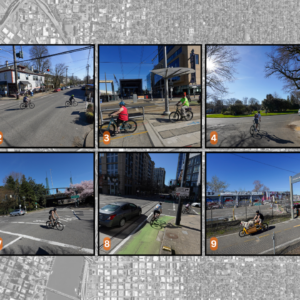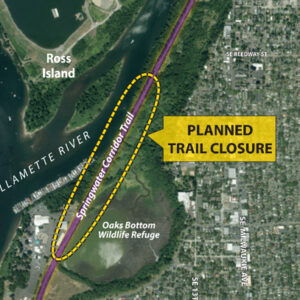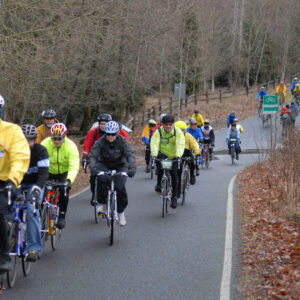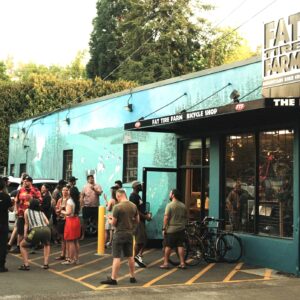
A sign announcing a closure of the Springwater Corridor has sparked concern throughout the community this morning. BikePortland is working to confirm details and more information.
On Thursday, several readers sent in photos of a large orange sign placed at the northern entry to the path at SE 4th and Ivon. The sign says, “Springwater Trail Closed: 8/5 – 8/9, 8 am – 4 pm” and includes a phone number for PGE customer service. A representative I spoke to at this number this morning was unable to find any information and said she would ask around and call me back when she finds out more.
A page on the Portland Parks & Recreation website mentions a July trail closure for “PGE maintenance activities” that I assume has been pushed back to the August dates mentioned above. “Once specific dates are known, this post will be updated. Detour routes for pedestrians and bicycles will be provided,” the website says. The website also includes a detour route map that shows the closure extent being 1.8 miles to the Oaks Bottom Wildlife Refuge path that leads up to SE Milwaukie Avenue.
The detour map — if it’s current and accurate — recommends bicycle users coming from the north go east to SE Gideon Street and then south on SE 17th Ave to SE Mitchell, to connect to the path at Oaks Bottom. From the south, they recommend the same route in reverse.
This is a very big deal in cycling circles because this section of the Springwater path is one of the busiest places for bike traffic in the city. Earlier this year we reported the SE Ivon entrance was the 9th busiest bicycling intersection in Portland. And in 2017 this same section of the path was named one of the top 10 busiest Strava segments in the entire United States.
I’ve got feelers out at Parks and PGE and will update this story when I hear back.
UPDATE, 10:28 am: A Portland Parks & Recreation spokesperson said they have updated their website with the following:
There will be a trail closure along the Springwater Corridor (see map above). The trail is anticipated to be closed Monday, August 5 – Tuesday, August 6 and again on Thursday, August 29 – Friday, August 30. Partial closures will occur Monday, August 26 – Wednesday, August 26. Detour routes for pedestrians and bicycles will be provided.
These dates are not the same as what PGE has posted on their sign. I expect to hear back from PGE soon and will hopefully have this all cleared up.
UPDATE, 8:30 pm: PGE Spokesperson Drew Hanson says dates shared on the Portland Parks update and website are correct and PGE will install new signs on both ends of the closure shortly. Here’s the statement from Hanson:
The dates and alternate route map shared by Portland Parks and Rec are correct. Signs with additional details are being placed at both ends of the closed sections next week. If those dates change due to hot weather limiting work, we will update the posted signs and I will send you notification as well.
The Springwater Corridor Trail will be closed (and a partial closure later in the month) on those dates for public safety from SE Ivon St. to the Oaks Bottom Wildlife Refuge Tunnel while PGE performs maintenance and repair work on transmission poles. The closures will last from 8AM – 4PM.








Thanks for reading.
BikePortland has served this community with independent community journalism since 2005. We rely on subscriptions from readers like you to survive. Your financial support is vital in keeping this valuable resource alive and well.
Please subscribe today to strengthen and expand our work.
First the Steel Bridge was closed to cyclists indefinitely until people complained and now the most crucial path in the city is closing for five days, but it’s a mystery why people think the cycling network is an unreliable replacement for a car and we have so much trouble getting our cycling mode share up.
I’m sure PG&E would close off I-5 or 205 for five days and expect everyone to be totally cool with it right?
ODOT did close I-5 recently for a weekend to replace a bridge and 84 for graffiti removal. It can and does happen for auto infrastructure and somehow people continue to drive.
For one night, in the middle of the night when nobody would be using it. And they mobilized a huge work force to get the work done ASAP.
That’s exactly the point. There’s no rush with this Springwater work. No biggie, it’s just cyclists.
EDIT: I see the I-5 part. But still, they had an alternate route that was actually viable.
Also it was widely publicized prior to the construction, not a dinky little sign
They literally closed the busiest part of I-84 for days. Everyone dealt with it.
They also closed I-5 for days. Everyone dealt with it.
As a matter of fact, I remember an article here about how I-84 should be eternally closed to cars.
Out by where I live the city is closing a road that is used for school dropoffs while school is in session for 2 months minimum, to install a better biking infrastructure for the local park. This means more kids will be walking and riding the bus.
I’m really struggling to understand the outrage here about PGE closing a section of the path to make it less likely fires occur or bicyclists and pedestrians get electrocuted. This is not just some ticky tack reason for closing the trail. They are doing work.
I-5 was closed for a weekend and 84 was closed for a few hours in the middle of the night to make sure it would inconvenience people as little as possible, and in both cases I’d be willing to bet the scope of work was a lot larger than whatever they’re doing here. I’m not saying this needs to mobilize millions of dollars like the 84 work but for possibly the most traveled section of bike facility in Portland I think a little more hustle than five days of closure is appropriate.
Alan and Aesir are missing the point, which is that whenever work impacts major car/truck routes, ODOT/PBOT goes out of their way to do the work at night or on weekends, which is when I-5 and I-84 were closed. Never never ever do they close major routes except at times that will cause the least inconvenience to drivers.
But close major cycling routes during peak commuting hours? – they do it all the time. PGE could pay for this work to be done at night or on weekends, but it would cost more so therefore they don’t do it. Inconvenience cyclists who rely on the route for commuting and work? Too bad for them.
This situation is remarkable to me in that cyclists were given any advance warning at all. In the wilds of SW where I live, major cycling routes will be closed with no warning. You can start down the Multnomah Blvd separated lane, for example, and run into a maintenance truck blocking the entire path, with no warning and no way around. It’s totally common.
Yet we wonder, as someone else said, why cycling mode share isn’t higher.
(Hope this post isn’t too negative. Gotta stay positive!)
Maybe the better strategy for this is to complain as drivers that shutting down the bike path for five days means FIVE DAYS OF HAVING TO DEAL WITH BIKE RIDERS CLOGGING UP THE DETOUR ROUTE!
Except they won’t as 17th can accommodate all the cyclists without delaying anyone. Perhaps an even better strategy would be to complain that the work is blocking an important auto route for people living along the trail.
“whenever work impacts major car/truck routes, ODOT/PBOT goes out of their way to do the work at night or on weekends”
A more useful way of framing it is that when work impacts tens of thousands of people, ODOT/PBOT will spend more to minimize the disruption than when it’s dozens of hundreds. This applies to work done on streets primarily used by car divers as well.
If the Springwater had as many users as I-84, and the were no alternate routes that could accommodate that many users, they’d do the work at night too.
This isn’t an example of bias or mode oppression, it’s an example of a rational response to the underlying facts.
No need to stretch the truth to make your point. I-84 was closed for 12 hours, but that included half of Sunday (until noon). Many of us are up and do things on Sunday mornings. We had to detour around the closure several times that day.
But it’s just closed to bicycles, right? Not people in cars?
/snark
As one of the many people who use this route for my daily commute, I am concerned that the proposed alternative is much more dangerous because bicyclists, pedestrians, runners, and skaters would have to share space with the motorized vehicle traffic. Why doesn’t the city close the alternative route to all motorized vehicles during the time they are redirecting Springwater users to the alternative route?
Could it be because endangering us during maintenance is fine but inconveniencing drivers is inconceivable?
The bike detour is along SE 17th, which has a good bike lane. If I were walking or running, I’d take SE 9th over Milwaukee and cross Powell at the pedestrian bridge.
There’s no reason to close any of those streets. I use them both frequently, and they are quite safe.
Agreed. I just wish there was a continuous bike lane on Milwaukee too, rather than stopping 800ft south of Powell. I actually find myself riding Milwaukee more often than 17th, and even as an alternative to the Springwater on busier days. I think it just feels faster to me. 17th also has more truck traffic FWIW. Rather than asking to close traffic on the detour, we should be asking: “What can we do (permanently) to the on-street routes to make them more attractive alternatives?”
Also, if I’m reading it correctly, the closure will be daily from 8AM to 4PM. I think its pretty reasonable to ask folks to ride the detour between those hours. You can still ride the springwater before 8AM and after 4PM.
The comedy of motorized vehicle traffic not wanting to share the space with motorized vehicle traffic.
I appreciate that they are doing time-limited closures and that they are providing advanced notification. I hope they add some addtional protection and notification along the detour route both as wayfinding for bikes and as notice to cars that is a temp. bike detour.
In my opinion they should set up a contingency plan where if they have to close this trail they have to temporarily close parking on 17th or Milwaukie and make a protected bike lane for the duration of the closure.
(And then make that “temporary” change permanent)
Generally where PGE does a trail closure (it also happens on Springwater in East County and used to impact my commute when I worked in Gresham) it’s related to replacing power poles or equipment, or other line maintenance. Given the lawsuits PGE and Pacific Power are paying out for wildfires, and the increasing fire danger in brush areas around Portland, I wouldn’t be surprised if they’re doing fuel reduction around the lines.
All the various bureaus, agencies, etc. have done work near where I live, and none have done better than PGE for being organized, efficient and courteous. That’s not to say this will all go perfectly, just that may be more likely with PGE.
The biggest difference between PGE and some of the others is it looked like PGE was there no longer than necessary, whereas some of the others were horrible and uncaring in comparison.
I think it’s a bit disingenuous to compare the closure of this trail with the closures of I84 and I5 that happened recently.
Just thinking about the scale of how many people are affected; I5 in the section they closed sees >75,000 vehicles per day on average. This section of the springwater sees 2100 at best. So of course ODOT is going to go out of their way to get the work done quickly and all in one shot.
They seem to be communicating the closures accurately, and the detour routes they’ve provided are fine. Anyone who is using the Springwater for commuting is probably interfacing with bike infrastructure similar to the bike lanes on 17th, unless they live in Sellwood and work Downtown. Recreational/exercise trips for folks who are only comfortable riding on paths can happen elsewhere, like the other direction on the Springwater. Daytime commuting trips that – for better or worse – happen using the freeways have nowhere to divert to except neighborhood streets. Diverting bike traffic doesn’t really cause as much social harm because we all know how quiet, clean, and space efficient bicycles are.
As others have pointed out, PGE is doing equipment maintenance and clearing potential brush fire fuel away from said equipment. I like having electricity to charge my ebike and clear air to breathe while riding it. In my mind, it’s a worthwhile tradeoff to have the path closed for a couple days.
Perhaps an approach during closures of bike paths like this would be partnering with PPB or other law enforcement to provide some stepped-up traffic patrols along bike detour routes.
I’m curious as to if they are going to put the trail closed signs at the intersection of the Springwater with the path under the tunnel OR if they will put them at the top of the trail at Milwaukie. If they are at the bottom it will be another instance like the TriMet elevator closed signs that if you needed to detour knowing that well before the closure can help make good route choices — knowing that when you get there requires backtracking (uphill in this case).
I’ll ride over next week and take a look-see
Good point. Probably worth having signs at 7th and Spokane. Seems like a good spot where could could then choose to either ride across Sellwood bridge or turn onto 7th before going down the hill.
What are they going to do about the dozens of people living under the freeway?